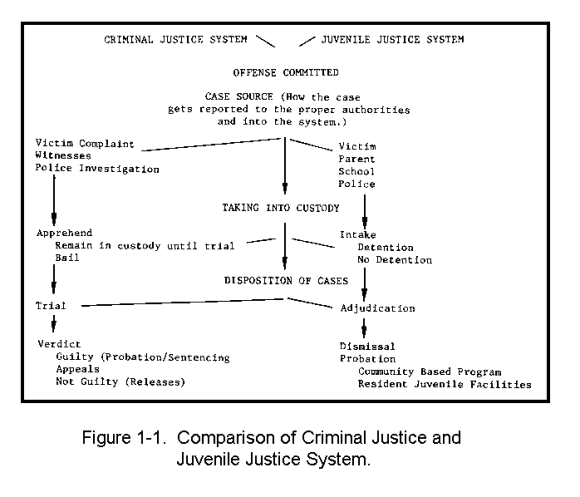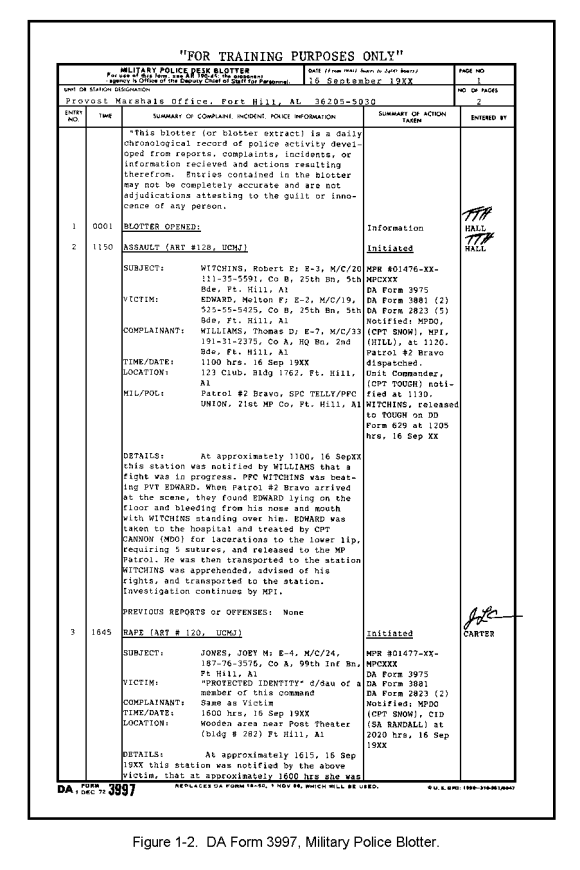|
RDL Homepage |
Table of Contents |
Document Information |
Download Instructions |
LESSON 1
PROCESSING JUVENILE OFFENDERS
OVERVIEW
LESSON DESCRIPTION:
In this lesson you will learn about the special handling of juvenile cases. The military police must understand the nature of the problem created by juvenile offenders due to the unique jurisdictional position of military authorities.
TERMINAL LEARNING OBJECTIVE
| ACTION: | Processing juvenile offenders. |
| CONDITION: | Given the information provided in this subcourse. |
| STANDARD: | To demonstrate competency of this task, you must achieve a minimum score of 70 percent on the subcourse examination. |
| REFERENCES: | The material contained in this lesson was derived from the following publications: FM 19-10, FM 19-20, and DA PAM 27-50. |
INTRODUCTION
A bank in Washington, DC received a hand scribbled extortion note demanding $10,000 in cash. The Washington police department was called and set up a stakeout at the designated drop point. As the police waited, up wheeled two 8 year olds and one 11 year old on skateboards looking for the money.
You often read in the newspaper where teenagers have shot someone or have been shot in attempted robberies while carrying deadly weapons. Perhaps students at a local high school are being held for the possession or sale of controlled substances. Most people feel this could only happen in another city or at best across town. Wrong, statistics show that there is an alarming increase in delinquency all over the United States, FBI crime statistics indicated juvenile delinquents commit 42.7 percent of vandalism; 39.2 percent of motor vehicle thefts; 39.9 percent of burglaries; 40.3 percent of arson, and 31.8 percent of larcenies.
As a military policeman, you must know the differences in the handling of juveniles and ordinary criminals. A juvenile is considered in most cases not to have yet reached the age and maturity where he is responsible for his actions. Therefore, special handling of juvenile cases is required in order to protect him/her. The military police must understand the nature of the problems created by juvenile offenders and the effect on military and civilian relations due to the unique jurisdictional position of military authorities.
Definitions.
Juvenile - an individual is classified as a juvenile by law. The age limit for treating an individual as a juvenile varies by state. Public Law 93-415 defines a juvenile as, any person who has not attained his 18th birthday. As a military policeman it must be further clarified that the individual is not only under the age of 18, but is not a service member or the spouse of a service member.
Juvenile delinquent - a youth under the age of 18, who commits an act which would be a crime if it were committed by an adult and is adjudicated a delinquent.
Status offender - an individual whose acts are prohibited because of the age as a minor. Examples of such acts would be truancy or runaways.
Juvenile dependent - those juveniles who depend on a military sponsor for support.
Sponsor - an active duty military member who is the parent of a juvenile.
Civilian juvenile - children of nonmilitary persons, who reside on, or who enter the military reservation, thereby coming under the control of the installation commander.
Jurisdiction.
Continental United States. Police authority on a military reservation may be cross jurisdictional with military, federal, state, local, or a combination of these. Several factors determine who has police authority. The type of offense committed and the authority of the state or federal government to legislate for the installation is important. The agency who handles the case is often a matter of policy rather than law. The provost marshal and staff judge advocate should have close liaison with civil authorities.
Military Jurisdiction. AR 210-10, gives general authority to the installation commander to create rules and regulations for the protection of all property, public and private, under his control, and the health, welfare, morale, and well-being of all persons under his command and supervision. All incidents occurring on the reservation including those involving juveniles have an effect upon command morale and safety. The control and handling of incidents is a major concern of the installation commander. Military police may be authorized to investigate offenses committed on the installation regardless of the suspect. Therefore, juveniles, whether civilians or dependents on post are governed by the rules and regulations of the installation commander. The Uniform Code of Military Justice does not apply to either dependent or nondependent juveniles. It does apply to members of the military under 18 years of age.
Federal Jurisdiction. Many crimes are federal violations as defined by Congress regardless of where the crime is committed within the United States. Counterfeiting, for example, is a federal offense anywhere it takes place in the United States. Under the Assimilative Crimes Act, state crimes are "adopted" as federal offenses if:
The crime is committed on a federal reservation where the federal government exercises exclusive or concurrent jurisdiction.
The crime is not in contravention of federal laws or policy.
State Jurisdiction. If the offense committed by the juvenile was a state crime, the local police and courts may take action. The military investigator, in assisting the commander, will be the first to enter the case.
Comparison of Juvenile Justice System and Criminal Justice System.
Juvenile offenders must be handled with care. The juvenile justice system as with the criminal justice system is geared toward reduction in crime. However, the criminal justice system also punishes the criminal. Juvenile justice has an overall objective of reform. Figure 1-1 compares how the juvenile offender is processed through the juvenile justice system with the criminal processing through the criminal justice system.
Detention of Juveniles.
Upon apprehension, a juvenile must be notified of his legal rights and the offense. Parents must then be notified of the apprehension. Again, the rights of the juvenile and offense for which apprehended must be given. While in detention, offenders must be kept in a comfortable, private place out of public view. Under no circumstances will youth offenders be housed with adult criminals. Investigators should be cautioned that they are to determine only if the offense occurred, not why, to gather pertinent data, and to conduct any appropriate interview.
In order to detain a juvenile, the following conditions must be met:
Detainment is authorized by the installation commander.
Detention is temporary. The detainment is for the purpose of transferring custody of the juvenile at the earliest possible time, either to the parents or to the appropriate state or federal agency.

Military police are also prohibited from certain procedures, unless offenders apprehended are to be prosecuted in federal or civil courts. These procedures include:
Obtaining fingerprints or photographs of the juvenile without proper written judicial authority (the juvenile judge).
Releasing names or pictures of juvenile offenders to the public.
Investigation of a Juvenile Offense.
Procedures to collect evidence on juvenile offenses are the same as those for an adult suspect. Normally, it is the military police who make the first contact in the apprehension of the offender. An excellent guideline for the investigative interview is to establish if an offense was committed by the juvenile by asking who, what, where, and how.
Safeguard of Juvenile Records.
Safeguard all juvenile offender records. Disclose only authorized information.
When preparing the Military Police Desk Blotter, DA Form 3997, do not list the names of the juvenile subjects, their parents, or sponsors. Protect identities of juvenile victims of offenses such as rape or child molestation. Enter "PROTECTED IDENTITY" in place of the victim's name when you prepare DA Form 3997. (See Figure 1-2.)
During a juvenile proceeding furnish information on the juvenile and the offense only to the court, counsel for the juvenile, the government, and others entitled to review sealed records.
Disposition of Juvenile Cases on Post.
The installation commander has both formal and informal authority to administratively deal with juveniles.
Informal:
Verbal reprimand.
Unofficial probation.
Letter of admonishment to the child and parents and may recommend assistance of a chaplain.
Restrict access to post facilities.
Formal. (When informal actions have been ineffective):
Revocation of privileges to the commissary, post exchange, theater, bowling alley, or driving on post.
Bar from post.
Termination of government quarters.
Statutory privileges such as hospital and dental can be denied only in extraordinary cases.

Practice Exercise

